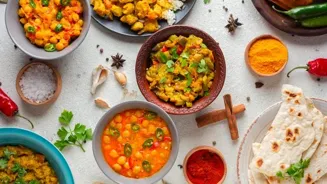Delve into the heart of Indian culture through its vibrant culinary traditions. From humble thalis to grand feasts, food encapsulates stories of history, beliefs, and community values. Discover how food intertwines
with festivals, Ayurveda, and spiritual practices, reflecting a diverse and rich cultural tapestry. Explore the significance of 'Atithi Devo Bhava' and the art of sharing
India, a land of vibrant colours, languages, and traditions, finds one of its most potent expressions in its diverse culinary landscape. Food isn't merely sustenance here; it is an integral part of our cultural identity, woven into the fabric of celebrations, rituals, and everyday life.
From the simple, nourishing thali in a village home to the elaborate, fragrant spread at a wedding feast, food speaks volumes about our history, beliefs, and social structures. Every dish tells a story, a flavourful narrative passed down through generations.
Indian culture values guests as God through food sharing
The concept of 'Atithi Devo Bhava' – treating guests as God – is deeply ingrained in Indian culture, and offering food is a paramount expression of this principle. Sharing a meal is considered an act of bonding, building trust, and fostering goodwill.
In many Indian homes, the guest is served first, ensuring their comfort and satisfaction. The emphasis is not just on providing sustenance but also on offering hospitality and creating a warm, welcoming atmosphere. This selfless act strengthens relationships and emphasizes community values.
Indian festivals: unique food traditions symbolize joy, prosperity, and cultural significance
Festivals in India are synonymous with elaborate food preparations, each region boasting its unique specialities for different occasions. Diwali, the festival of lights, brings forth a dazzling array of sweets like laddoos, barfis, and halwas, symbolizing prosperity and joy.
Holi, the festival of colours, is incomplete without gujiya, a sweet dumpling, and thandai, a refreshing milk-based drink.
Each festival is associated with specific dishes that reflect the season, agricultural practices, and religious significance, adding a layer of cultural depth to the celebrations.
Ayurveda influences Indian cuisine for holistic health
The influence of Ayurveda, the ancient Indian system of medicine, is evident in the way food is approached in Indian cuisine. The focus is on balancing the three doshas – Vata, Pitta, and Kapha – through specific ingredients and cooking methods.
Spices like turmeric, ginger, and cumin are not just flavour enhancers; they are also valued for their medicinal properties, promoting digestion, boosting immunity, and overall well-being. Food is thus seen as a holistic approach to health, nourishing both the body and the mind.
Prasadam: sacred food shared in Indian temples
The concept of 'prasadam,' food offered to deities and then distributed among devotees, is a common practice in temples and religious ceremonies across India. This consecrated food is believed to be blessed and imbued with divine grace.
Sharing prasadam fosters a sense of community and reinforces faith. The act of offering food to the divine symbolizes gratitude and devotion, while partaking in it is considered auspicious and spiritually uplifting. It exemplifies the link between food, faith, and collective well-being.
Vast regional variations in Indian cuisine reflect diverse influences
Regional variations in Indian cuisine are vast and fascinating, reflecting the local climate, geography, and cultural influences. The fertile plains of Punjab boast rich, wheat-based dishes with generous use of dairy products.
The coastal regions of South India favour rice, coconut, and seafood, creating light and flavourful curries. The arid landscapes of Rajasthan rely on lentils, millets, and preserved ingredients, resulting in dishes that are both nutritious and resourceful.
This culinary mosaic showcases the incredible diversity and adaptability of Indian food culture.
Food shapes Indian culture, bonding families through shared meals
Food plays a vital role in shaping the Indian cultural landscape. Sharing meals has been one of the building blocks of relationships, creating bonds between the families
Ayurveda influences festival sweets with turmeric-spiced laddoos
The festival of lights cannot be celebrated without sweets such as laddoos and barfis. Ayurveda has influenced our meals, making use of spices such as turmeric.
Temples offer blessed food for faith and well-being
Many temples offer the practice of parsadam; this food is offered to the deities and said to have blessings. The food is a link between faith and well being.
AI Generated Content. Glance/InMobi shall have no liability for the content












